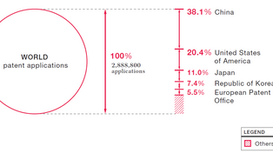What is trademark distinctiveness?
- May 19, 2023
- 1 min read

Trademark distinctiveness refers to the characteristics that allow a trademark to differentiate the source of a product or service. If a symbol cannot identify the source of a product, it cannot function as a trademark. Developing trademark distinctiveness is similar to running a marathon: it's essential to have a certain advantage at the starting line, but it's even more crucial to keep the business going.
Newly coined terms like "SONY," "Haier," and "Kodak" have inherent distinctiveness, unlike existing words like "Apple," "Shell," and "Amazon," demonstrating the importance of hard work in building a brand. However, even if a trademark is lucky enough to get registered, it may be invalidated if it infringes on a prohibitive provision on trademark registration. For example, if a logo trademark is too similar to a national emblem, it cannot be registered. In such cases, the trademark is like an old car that hasn't been maintained and could break down at any time.
It's important to note that trademark distinctiveness depends on the products or services covered by the trademark. For instance, the "Apple" trademark is distinctive when used on computers or mobile phones but not when used on juice since consumers may assume that the juice is made of apples.

































Comments